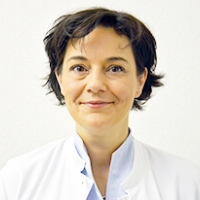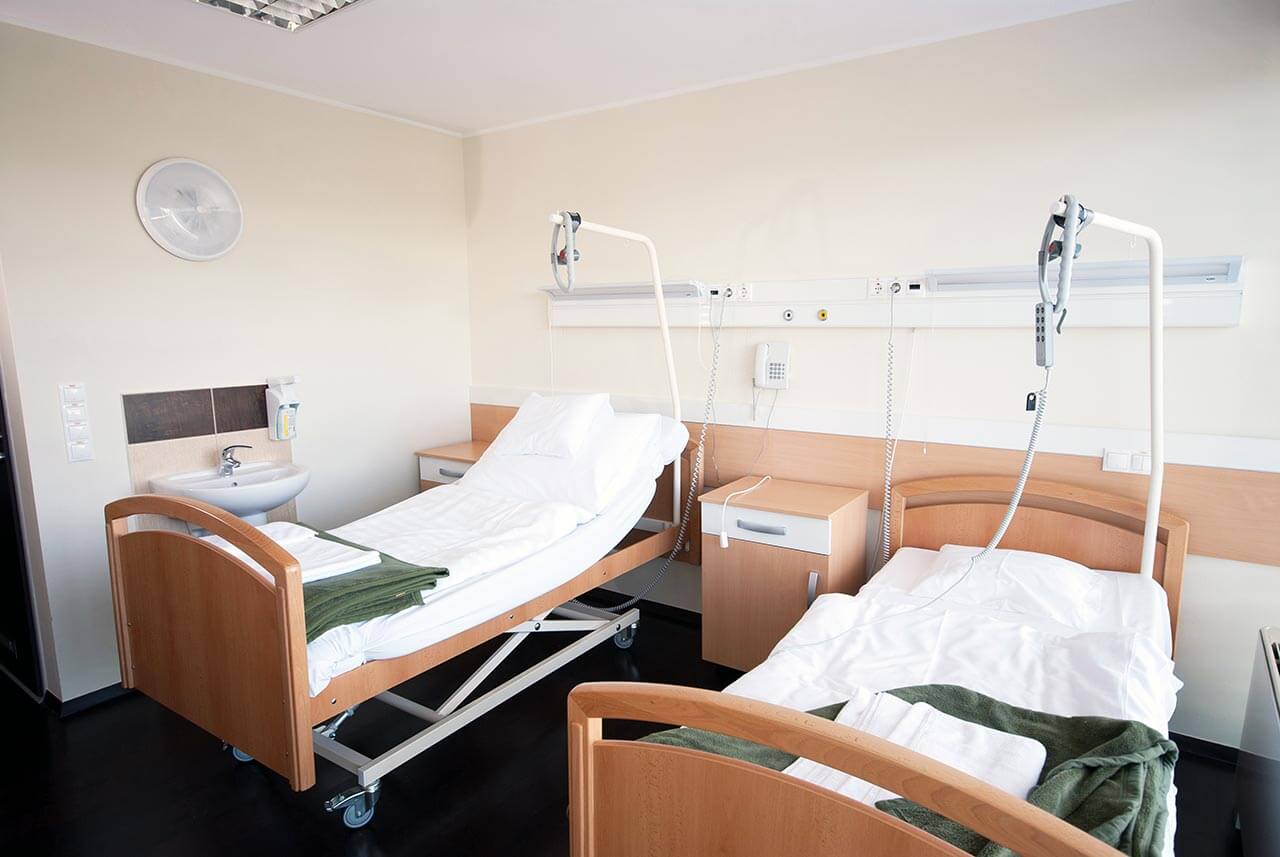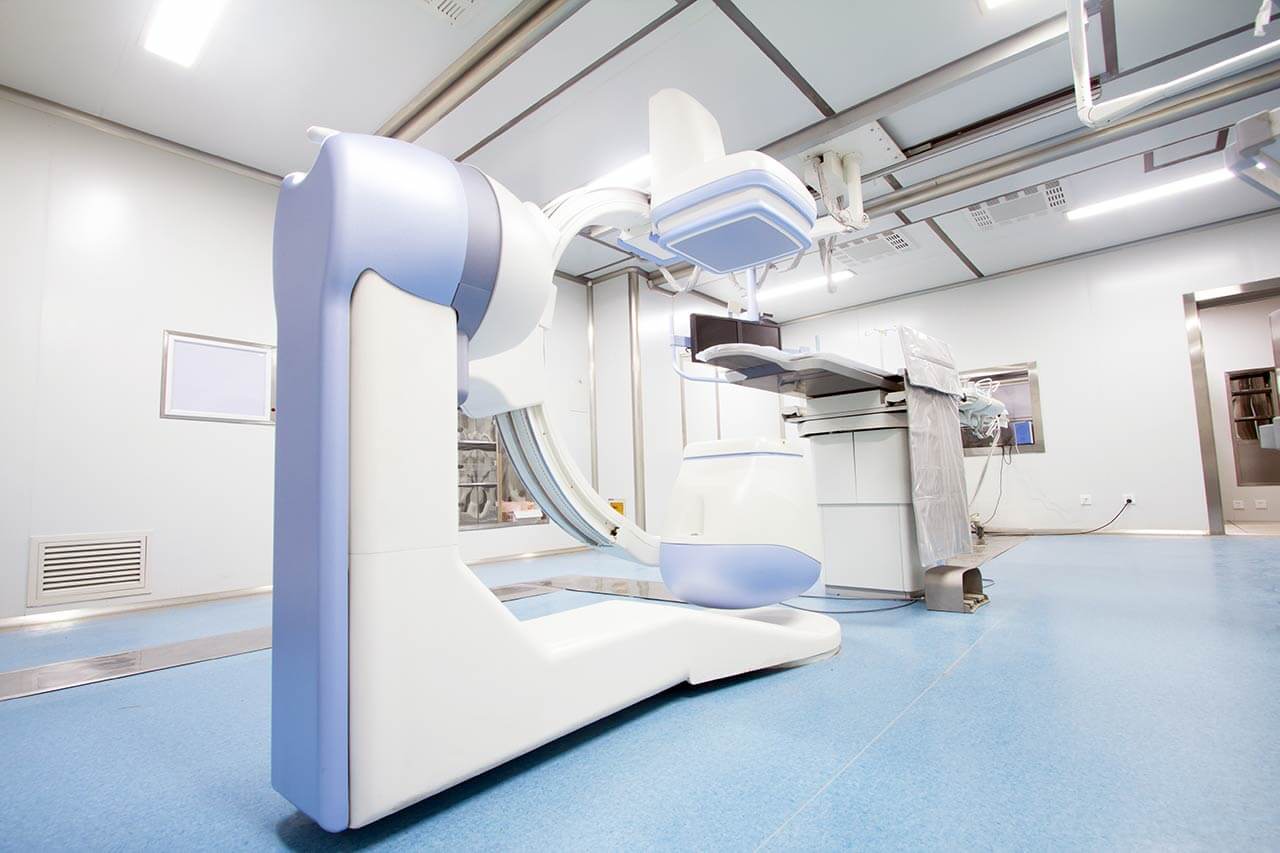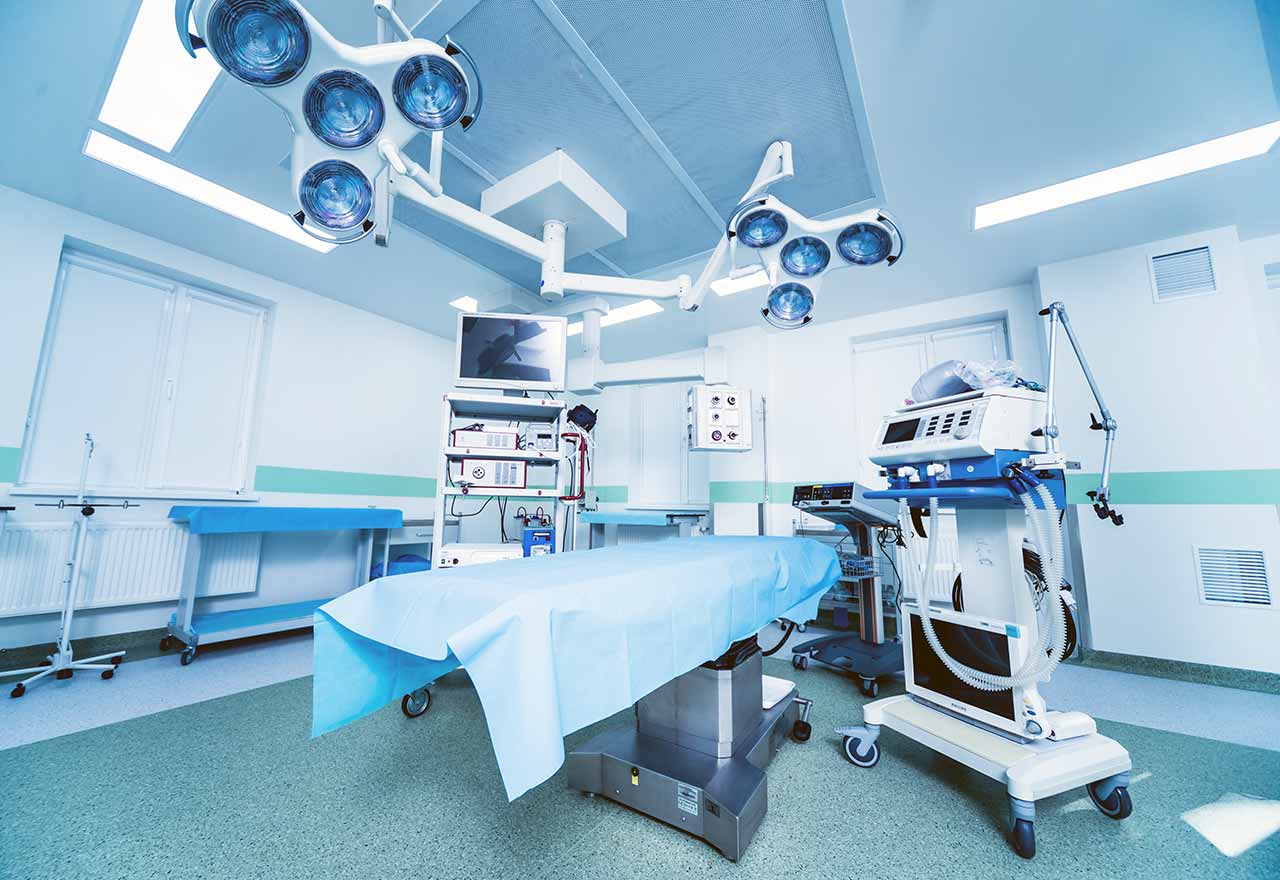
The program includes:
- Initial presentation in the clinic
- clinical history taking
- review of medical records
- physical examination
- laboratory tests:
- complete blood count
- inflammation indicators (CRP, ESR)
- abdominal and pelvic ultrasound
- digital rectal examination
- colonoscopy (on indication 1000 €)
- nursing services
- consultation of related specialists
- consultation of the chief physician and all leading experts
- development of individual treatment plan
- written statement
Service
You may also book:
 BookingHealth Price from:
BookingHealth Price from:
About the department
The Department of Adult and Pediatric General and Abdominal Surgery, Hernia Surgery, Hepatopancreatobiliary Surgery, Colorectal Surgery and Endocrine Surgery at the Hospital Oberberg Waldbrol offers the full range of surgical treatment in the areas of its specialization. The department's surgeons operate on patients with diseases of the stomach, esophagus, bowel, liver, gallbladder, biliary tract, and pancreas. Of particular interest to the doctors are the surgical interventions for the removal of gastrointestinal malignancies. The department's surgeons cooperate closely with specialists from the Cancer Center Oberberg, which allows them to carry out comprehensive treatment for cancer patients. The surgeons at the medical facility also perform hernia repair surgery and operations for colorectal diseases. Thyroid surgery using state-of-the-art intraoperative neuromonitoring systems is regularly performed here. Surgical interventions for young patients are performed on an outpatient basis. The department's specialists have vast experience in sparing minimally invasive surgery when the pathological focus is approached through several small skin and soft tissue incisions, which reduces surgical risks, significantly alleviates pain, and shortens the period of hospital stay. The department has 40 beds for the accommodation of patients. The department is headed by Dr. med. Stefanie Hild. She is an experienced surgeon and a true professional dedicated to her work.
The department's priority clinical focus is the surgical treatment of gastrointestinal cancers. The department is part of the Cancer Center Oberberg, where surgeons, oncologists, radiation therapists, radiologists, psycho-oncologists, and other experts work hand in hand. The close cooperation of physicians from related specialties allows for the provision of the most effective treatment for each patient. The department's team of surgeons regularly operates on patients with colon cancer. This type of cancer is considered the third most common cancer in the world and, unfortunately, the second leading cause of death from cancer. The success of colon cancer treatment largely depends on surgery, as it is often the first-line therapy. The department's surgeons always strive to perform the surgical resection of malignant colon tumors using a minimally invasive technique, with open surgery being performed in extremely complex clinical cases. In the early stages of the oncological process, the department's specialists remove only the tumor and adjacent structures, which allows the doctors to preserve the integrity and function of the organ. If surgery is performed at an advanced stage of colon cancer, doctors will remove a significant portion of the colon, after which a stoma may be required. Before and/or after surgery, the patient also receives conservative treatment, such as chemotherapy, radiation therapy, targeted therapy, immunotherapy, or symptomatic treatment. If, based on the results of comprehensive diagnostics of the patient, the department's specialists determine that the colon malignancy is unresectable, chemotherapy and irradiation come to the fore. These treatment methods aim to slow tumor growth and prevent the spread of atypical cells throughout the body.
An integral part of the department's daily clinical practice is the treatment of patients with inguinal, umbilical, and incisional hernias. A hernia is the protrusion of an organ or part of an organ from the abdominal cavity under the skin through a natural opening. In cases of inguinal hernia, internal organs come out of the abdominal cavity through the inguinal canal; in cases of umbilical hernia, internal organs protrude through the umbilical ring; and incisional hernias result from the protrusion of abdominal organs through a defect formed by postoperative scar divergence. The only effective treatment method is hernia repair surgery. The department's surgeons brilliantly repair hernias using mesh implants, which is the gold standard of modern hernia repair surgery worldwide. Surgical interventions are performed using laparoscopic techniques on an outpatient basis.
The department also represents the direction of hepatopancreatobiliary surgery. The specialists in this field operate on patients with pathologies of the liver, gallbladder, biliary tract, and pancreas. The team of surgeons at the medical facility admits patients with liver tumors and liver metastases, gallbladder and bile duct neoplasms, gallstone disease, liver cysts, pancreatic tumors, cirrhosis, pancreatitis, and cholecystitis. In most cases, the specialists use minimally invasive surgical techniques, so the risks of postoperative complications are minimal, the patient does not experience severe pain, and a good aesthetic result is ensured.
Colorectal interventions complement the department's surgical options. The department's operating rooms serve to perform surgical interventions for inflammatory perianal processes, anal fistulas, anal fissures, and hemorrhoids (Milligan-Morgan technique, Longo procedure, or linear stapled hemorrhoidectomy). In addition, colorectal surgeons successfully perform transanal resection of adenomas and polyps and transanal resection of the rectum (STARR procedure in cases of hemorrhoids with rectal prolapse). Priority is always given to minimally invasive surgical techniques.
In the field of endocrine surgery, the primary focus is on performing interventions on the thyroid gland. The department performs surgery for partial or total removal of the organ in patients with thyroid cancer, thyroid adenoma, diffuse toxic goiter, autoimmune thyroiditis, and thyroid nodules. A surgical approach is provided through a small skin incision, which ensures minimal traumatization of healthy tissues and a good cosmetic result. A binocular loupe and intraoperative neuromonitoring are used during thyroid surgery to eliminate recurrent laryngeal nerve lesions, which may lead to voice loss.
The department also offers the services of a team of pediatric surgeons. A key focus of pediatric surgery is on inguinal hernia repair, operations for undescended testicles, and phimosis surgery. Children undergo surgery on an outpatient basis, so there is no need for a mandatory hospital stay. Surgeons always give preference to minimally invasive techniques.
The department's range of medical services includes:
- General and abdominal surgery
- Surgery for malignant gastrointestinal diseases
- Surgery for stomach cancer
- Surgery for colon cancer
- Surgery for esophageal cancer
- Surgery for benign gastrointestinal diseases
- Surgery for gastroesophageal reflux disease
- Surgery for chronic inflammatory bowel diseases: Crohn's disease and ulcerative colitis.
- Surgery for stomach and duodenal ulcer disease
- Surgery for abdominal injuries
- Surgery for benign tumors (for example, lipomas and atheromas)
- Surgery for abscesses
- Surgery for inflammatory processes in the chest wall and pleural cavities
- Drainage for pneumothorax
- Appendectomy
- Cholecystectomy
- Surgery for malignant gastrointestinal diseases
- Hernia surgery
- Surgery for inguinal hernias
- Surgery for umbilical hernias
- Surgery for incisional hernias
- Hepatopancreatobiliary surgery
- Surgery for malignant diseases of the liver, gallbladder, biliary tract, and pancreas
- Surgery for liver cancer and liver metastases
- Surgery for gallbladder cancer
- Surgery for bile duct cancer
- Surgery for pancreatic cancer
- Surgery for benign diseases of the liver, gallbladder, biliary tract, and pancreas
- Surgery for gallstone disease
- Surgery for liver cysts
- Surgery for cirrhosis
- Surgery for pancreatitis
- Surgery for cholecystitis
- Surgery for malignant diseases of the liver, gallbladder, biliary tract, and pancreas
- Colorectal surgery
- Surgery for rectal cancer
- Surgery for perianal inflammations
- Surgery for anal fistulas
- Surgery for anal fissures
- Surgery for hemorrhoids: Milligan-Morgan technique, Longo procedure, and linear stapled hemorrhoidectomy
- Surgery for anal polyps and anal canal adenomas
- STARR procedure for hemorrhoids with rectal prolapse
- Endocrine surgery
- Surgery for benign and malignant thyroid diseases
- Pediatric surgery
- Surgery for inguinal hernias
- Surgery for undescended testicles (cryptorchidism)
- Surgery for phimosis
- Other medical services
Curriculum vitae
Dr. med. Stefanie Hild graduated from the University of Bonn and the Johannes Gutenberg University of Mainz, where she received her doctoral degree. Dr. Hild underwent her medical training in Waldbrol. She was an Assistant Physician and Senior Physician in the Departments of Surgery at the Helios Clinic Titisee-Neustadt, the DRK Altenkirchen-Hachenburg Hospital, and the St. Johannes Hospital Troisdorf-Sieglar. Before holding the position of Head Physician of the Department of Adult and Pediatric General and Abdominal Surgery, Hernia Surgery, Hepatopancreatobiliary Surgery, Colorectal Surgery and Endocrine Surgery at the Hospital Oberberg Waldbrol, Dr. Hild worked as the Head Physician in the Department of Surgery at the Elbe-Elster Hospital in the town of Finsterwalde in Brandenburg.
Photo of the doctor: (c) Klinikum Oberberg GmbH
About hospital
The Hospital Oberberg Waldbrol is a progressive medical facility with a priority focus on effective treatment and high-quality patient care. The medical complex is an academic hospital of the University of Bonn, which guarantees direct access to medical innovations.
The medical staff of the hospital applies an individual approach to each patient, which allows the doctors to achieve the optimal treatment result. The hospital employs 550 highly qualified specialists who regularly undergo advanced training courses. The doctors of the hospital take part in both national and international congresses, which helps them stay informed on medical innovations and share personal clinical experience with their colleagues.
The hospital has 275 beds for inpatient treatment. It is worth noting that recently the hospital has been significantly restored, and therefore, in addition to the innovative equipment and competent personnel, the medical facility has advanced infrastructure and a modern design of the patient rooms.
The hospital includes the Center of Excellence for Vascular Surgery Oberberg, the only medical facility in the region, which offers high-precision diagnostics and effective treatment of all vascular diseases. It uses both conservative and classic surgical and interventional (for example, balloon catheterization) techniques.
In addition, the hospital has one of the most advanced systems for computed tomography (CT), which allows the doctors to get instant images with minimal radiation exposure to the body.
Photo: (c) depositphotos
Accommodation in hospital
Patients rooms
The patients of the Hospital Oberberg Waldbrol live in cozy and comfortable rooms designed in light colors. Each patient room has a shower and a toilet. The furnishings of a standard room include an automatically adjustable bed, a bedside table with a pull-out tray, a wardrobe for storing clothes, a table and chairs for receiving visitors, a TV, and a telephone. Wi-Fi is also available in the patient rooms.
The hospital also has enhanced-comfort rooms, which additionally include a refrigerator, a safe, and upholstered furniture. The bathroom has a hairdryer, bathrobe, toiletries, and towels.
Meals and Menus
The patients at the clinic are offered a daily choice of three menus. If, for some reason, you do not eat all the foods, you will be offered an individual menu. Please inform the medical staff of your food preferences prior to treatment.
The hospital also houses a cozy cafe that serves complex breakfasts and lunches, tasty main courses, and salads. The menu also includes a wide variety of desserts and hot drinks.
Further details
Standard rooms include:
![]() Toilet
Toilet
![]() Shower
Shower
![]() Wi-Fi
Wi-Fi
![]() TV
TV
Accompanying person
Your accompanying person may stay with you in your patient room or at the hotel of your choice during the inpatient program.
Hotel
You may stay at the hotel of your choice during the outpatient program. Our managers will support you for selecting the best option.




